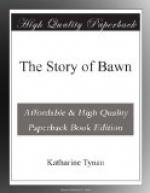I put down the letter with an indifferent air till the little maid had left the room. When she had gone I snatched it up and was about to read it, when my godmother called me, and then I thrust it into my bosom unread. I placed it over my heart and it felt warm there. It brought me into touch with him, so that, after all, it was not so bitter to be going since I could write. And the very keeping back the reading of the letter was sweet.
I was able to face my godmother with a smiling face, although I’ve no doubt my eyes still bore the traces of tears.
“You are a dear child, Bawn,” she said, lifting my face by the chin, and looking down into my eyes, “a dear child!”
I felt a hypocrite at her praises, for I had been in flat rebellion a little while before, and it was only the letter that had enabled me to lift up my heart; but her mind was too occupied for her to notice how my eyes fell and the guilty expression I must have worn.
A minute later we were in the cab, and I was watching the stream of people in the street eagerly to see if I might see Anthony Cardew’s face among them. But I did not see any one at all resembling him.
And presently we were in the train and had a carriage to our two selves; and when the train had started my godmother took out of her handbag my grandmother’s letter.
“I am going to let you read this, Bawn,” she said, “for I think you are of an age now to be taken into our difficulties. I confess it puzzles me.”
CHAPTER XIX
THE CRYING IN THE NIGHT
“My dearest daughter,” the letter began; it was so my grandmother always addressed Mary Champion. “We are pleased with the fine accounts of how Bawn is enjoying herself and your gaieties and the old friends you have met. The house is very lonely without Bawn, and I miss your coming, and there has been no letter from Theobald since you went. Perhaps Bawn has had one. We seem to realize that we are old and our children dead and their children away from us, all at once.”
The letter went on to talk of trivial and ordinary things, but my grandmother was bad at deception, and one felt that her thoughts were not in the things she told, but that they were written with an intention to conceal something. And at last the thin deception gave way.
“Mr. Dawson has been to see Lord St. Leger,” ran the last paragraph. “He had some astounding news. And Mrs. Dawson has driven over to call, and we are to dine with them next week. I wish you were home, Mary. I want you to lean upon.”
When I had read I turned amazed eyes on my godmother.
“The Dawsons!” I said. “And we used always to say that though every other house in the county were opened to the Dawsons, Aghadoe Abbey would shut its door in their faces.”
“It shall shut its door,” Mary Champion said indignantly. “He is frightening them because they are old and have no son to lean upon. Garret Dawson is an evil plotter and schemer, and there is blood and tears on his money. Aghadoe shall be safe from him.”




